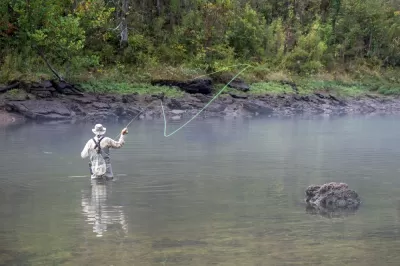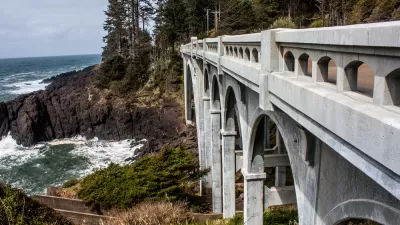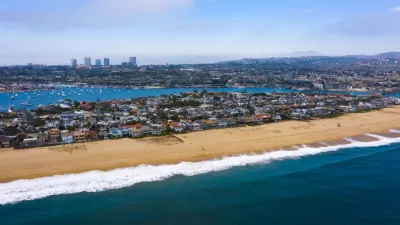Colorado is one of few U.S. states that has decided that private property owners supersede the public when it comes to access to rivers and streams.

“Who owns the beds of Colorado’s rivers?”
Ben Goldfarb reports for High Country News about a lawsuit that could change Colorado’s unique law that declares most of the state’s rivers to be non-navigable, and thus owned by adjacent property owners.
“From a river-access standpoint, Colorado is among the West’s oddest states,” explains Goldfarb. “Federal law dictates that the beds of ‘navigable’ rivers — waterways once used as highways for commerce — belong to the states, which, in turn, generally allow boaters and anglers to use them.”
“Colorado has historically denied that it even has navigable rivers,” adds Goldfarb. “In 1912, the state’s Supreme Court opined that the state’s waterways — steep, rushing, canyon-bound — were ‘nonnavigable within its territorial limits.’ By that logic, the beds of even major rivers belonged not to the state, but to the owners of adjacent private properties.”
Enter Roger Hill, who was repeatedly attacked by a property owner while fishing on the Arkansas River and decided to sue the property owners and the state, claiming that the river is, in fact, navigable.
More details on the case Hill has built to prove the river is navigable, with commercial traffic using the river back to the 1870s, is included in the article. Goldfarb also notes that Colorado is not the only state to litigate the issues of public access to rivers in recent years.
“In 2010, the Utah Legislature barred the public from wading non-navigable waters through private property, effectively closing more than 40% of the state’s miles of fishable streams; although anglers and boaters sued, a judge upheld the law last year,” for example. Advocates in New Mexico succeeded in fighting back a law that restricted access to the state’s rivers in 2015.
FULL STORY: The Colorado stream case that could revolutionize river access

Alabama: Trump Terminates Settlements for Black Communities Harmed By Raw Sewage
Trump deemed the landmark civil rights agreement “illegal DEI and environmental justice policy.”

Study: Maui’s Plan to Convert Vacation Rentals to Long-Term Housing Could Cause Nearly $1 Billion Economic Loss
The plan would reduce visitor accommodation by 25% resulting in 1,900 jobs lost.

Why Should We Subsidize Public Transportation?
Many public transit agencies face financial stress due to rising costs, declining fare revenue, and declining subsidies. Transit advocates must provide a strong business case for increasing public transit funding.

Wind Energy on the Rise Despite Federal Policy Reversal
The Trump administration is revoking federal support for renewable energy, but demand for new projects continues unabated.

Passengers Flock to Caltrain After Electrification
The new electric trains are running faster and more reliably, leading to strong ridership growth on the Bay Area rail system.

Texas Churches Rally Behind ‘Yes in God’s Back Yard’ Legislation
Religious leaders want the state to reduce zoning regulations to streamline leasing church-owned land to housing developers.
Urban Design for Planners 1: Software Tools
This six-course series explores essential urban design concepts using open source software and equips planners with the tools they need to participate fully in the urban design process.
Planning for Universal Design
Learn the tools for implementing Universal Design in planning regulations.
Caltrans
Smith Gee Studio
Institute for Housing and Urban Development Studies (IHS)
City of Grandview
Harvard GSD Executive Education
Toledo-Lucas County Plan Commissions
Salt Lake City
NYU Wagner Graduate School of Public Service





























